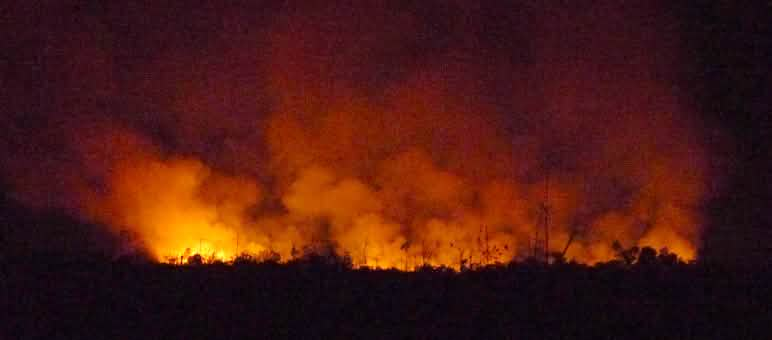
Forests ablaze in Sumatra – and the EU pours oil on the fire
: Rainforests are burning on the Indonesian island of Sumatra. The arsonists: palm oil companies that need land for their plantations. And while humans, animals and plants are helpless in the face of the fires, the EU industry committee just voted to increase the biofuel share in motor vehicle fuels.
Singapore is sounding the alarm. For several days, Indonesia’s neighbor has been experiencing the worst air pollution ever measured there. The index rose to 321 – values above 100 are considered a health hazard.
The main perpetrators are above all palm oil companies making room for their vast monocultures. Satellite images show more than 100 hotspots. Although banned in Indonesia, the slash-and-burn method is considered to be the most efficient way to clear rainforests. And palm oil is the cheapest “biofuel” –1.9 million tons were blended into diesel in Europe last year.
Various committees are currently reviewing the EU’s agrofuel policy. Most recently, the Committee on Industry, Research and Energy met on June 20 and poured oil on the fire. The committee voted to increase the share of biofuels from food crops to 6.5 percent, rather than capping it at 5 percent as planned. Furthermore, the emission of greenhouse gasses from indirect land use change (ILUC) – the need to cultivate new land for food crops to compensate for land lost to the production of agrofuels – is not going to be taken into account, nor even determined.
Only last year, northern Sumatra was the scene of a great tragedy: In the province of Aceh, around one hundred orangutans perished in fires set to clear land for oil palm plantations.
The dangerous smog has prompted Singapore’s government to call on Indonesia’s environment minister to take immediate action, and on June 20, a delegation was sent to a crisis summit in Jakarta. “On the international front, we need urgent and definitive action by Indonesia to tackle the problem at the source,” wrote Singapore’s Environment Minister Vivian Balakrishnan, calling for harsh penalties for the companies that illegally set fires. “No country or corporation has the right to pollute the air at the expense of Singaporeans' health and wellbeing.”
However, Indonesian government officials are attempting to deflect the blame, noting that foreign palm oil investors – including companies based in Singapore – are responsible for some of the fires. The companies refuted this immediately, of course.
Wilmar International, a company notorious for its human rights and environmental protection record, is among the largest palm oil producers headquartered in Singapore.
We can still act: the EU’s biofuels policy will be put to a vote on July 10 in the environment committee, and on September 10 in the plenary session of Parliament.
Please sign our petition to the EU: https://www.rainforest-rescue.org/mailalert/908/biofuel-eu-destroys-700-000-hectares-of-rainforest
Biofuel not only destroys rainforests and the livelihoods of forest dwellers, it also exacerbates world hunger. While this has long been known, it was confirmed again by a recent study. According to Joel Cohen of Rockefeller University, New York, the planet could theoretically support a population of ten to eleven billion. The grain is already available – but only about half of it is eaten by humans. The rest is used for animal feed, biofuels and lubricants.
Source: http://www.guardian.co.uk/world/2013/jun/20/singapore-pollution-record-levels

EU destroys 700,000 hectares of rainforest for biofuels
The EU wants to save our climate with supposedly green biofuels and has deemed palm oil "sustainable". Tell the EU to abandon its misguided biofuels policy now.

Biofuel
The use of bioethanol and biodiesel in motor vehicles is a misguided attempt to save the climate. The ugly reality is that "green" fuels are destroying rainforests, accelerating climate change and condemning millions to poverty and hunger.